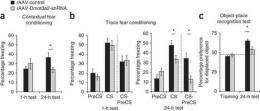Reducing hippocampal Dnmt3a2 levels in young adult mice impairs memory formation. Image (c) Nature Neuroscience (2012) doi:10.1038/nn.3151
(Medical Xpress) -- A team of researchers working out of the Interdisciplinary Centre for Neurosciences at the University of Heidelberg have found that older mice that had levels of the enzyme DNA methyltransferase (Dnmt3a2) increased in their brains regained the memory abilities of younger mice. They also found, as they describe in their paper published in the journal Nature Neuroscience, that young mice that had their levels of Dnmt3a2 reduced lost their memory abilities similar to those of aging mice.
To come to these conclusions, the team, made up of members, Ana Oliveira, Thekla Hemstedt and Hilmar Bading, injected a virus that contains an extra gene responsible for the creation of Dnmt3a2, directly into the hippocampus’ of several mice that were already showing signs of diminished memory abilities due to normal aging. Subsequent testing showed the older mice were then able to perform memory tests as well as younger mice.
To test the memory of the mice, the team gave each mouse a new object to investigate for a period of time, then took it away. The next day they gave the same mouse the new object, and also another different kind of object. Prior tests had shown that younger mice will immediately begin checking out the newer object, while older mice will spend equal amounts of time investigating both objects, having apparently forgotten they’d already investigated one of them the day before. Once injected, the older mice spent most of their time checking out the new object, indicating that an increase of the enzyme had caused their memory faculties to resort back to what it was before they grew old. The team also performed an identical experiment except for that the virus introduced caused just half as much of an increase in the enzyme and found that the smaller increase didn’t change memory abilities at all, indicating that there must be some sort of threshold.
And just to make sure it was the levels of Dnmt3a2 found in the hippocampus that were causing the changes in memory abilities, the team used a similar technique to cause the levels to drop in a group of younger mice and found their memory abilities diminished in ways similar to natural aging.
Unfortunately, because of differences in physiology, there is no way to try the same experiment on human beings, but the researchers are looking into other ways to change the levels of Dnmt3a2 for people to see if it might produce the same sort of results. In the meantime, the team suggests that people exercise their brains and bodies because doing so tends to increase levels of Dnmt3a2 naturally.
More information: Rescue of aging-associated decline in Dnmt3a2 expression restores cognitive abilities, Nature Neuroscience (2012) doi:10.1038/nn.3151
Abstract
Cognitive abilities decline in normal aging, yet the underlying molecular mechanisms are poorly understood. We found that aging was associated with a decrease in the expression of the DNA methyltransferase Dnmt3a2 in the hippocampus and that rescuing Dnmt3a2 levels restored cognitive functions. Moreover, we found that Dnmt3a2 is an activity-regulated…
Journal information: Nature Neuroscience
© 2012 Medical Xpress




















